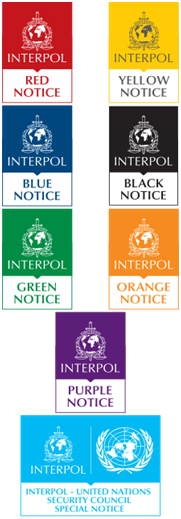Interpol notices play a crucial role in the extradition process, facilitating international cooperation among law enforcement agencies in the search, arrest, and transfer of suspects or convicted individuals.
These notifications contain detailed information about an individual's identity and the crime for which they are wanted, assisting countries that request extradition in making informed decisions based on recorded facts.
Thus, Interpol notices help to simplify and standardize processes of international mutual legal assistance, thereby ensuring compliance with international standards and agreements.
However, it's important to note that the use of these notifications must be carried out in accordance with legal rights and procedures to ensure a level of protection for the rights of all parties involved in the proceedings.
What is an Interpol notice?
An Interpol notice is an international message designed for the exchange of vital information among law enforcement agencies from different countries. Interpol lawyers help to challenge all kinds of Interpol notices. These notices aid in combating crime, searching for criminals and missing persons, as well as in preventing security threats. There are several types of Interpol notices, each with its own specific purpose and application area.

- Red Notice. A Red Notice indicates the location of an individual for whom extradition is sought, and requests their arrest. Lawyers also help with Interpol red notice removal at all stages to ensure you have a positive outcome.
- Blue notice. Blue notices are used to gather information about individuals, their whereabouts, and associations. This notice aids in tracking the movements of a suspect.
- Green notice. Green notices warn about individuals who commit crimes and pose a threat to public safety. Such notices can be used to prevent repeat offences.
- Yellow Alert. A Yellow Alert is intended for the search of missing persons, particularly minors. It can also be used to identify individuals who are unable to provide information about themselves.
- Black notice. Black notices are used to identify unidentified bodies. This helps to solve the crime and establish the identity of the victim.
- Orange alert. Orange alerts warn you about events that pose security threats, such as terrorist attacks or the transport of hazardous materials. This helps to prevent potential threats.
- Purple notice. Purple notices are used to share information on how criminals operate, for example, regarding fraud schemes and new methods of committing crimes. This notice aids in the dissemination of knowledge about criminal activities.
What is Red Notice, and why it is important?
A Red Notice is a request issued by Interpol to law enforcement agencies in various countries for the search and temporary arrest of an individual pending extradition or other legal proceedings. These notices are issued at the request of member states with the aim of locating and detaining individuals who are wanted for prosecution or to serve a sentence.
Countries can issue red notices if they have reason to believe that the person sought is under their jurisdiction or involved in a serious crime. These notices are usually based on a warrant or court ruling and contain identifying information (photo, fingerprints, document number), as well as information about the crime, the law under which the criminal case was initiated, and a reference to the warrant or decision.

How Interpol Notices Trigger Extradition
For Interpol to initiate extradition proceedings, the investigative body of the country must complete several key steps.
First, it's necessary to confirm that the person in question has left the country, usually to avoid criminal prosecution.
Following this, investigators must choose one of two options: to conduct a pre-trial investigation or trial in absentia, or to extradite the individual through the competent authorities of another country.
To initiate the extradition process, it's crucial for the individual to be issued an international arrest warrant through Interpol, as this is a prerequisite. This involves gathering evidence that the person has failed to appear in court more than twice without a valid reason, and the official recognition of him or her as a suspect or accused.
After a person has been declared wanted internationally, competent authorities from other countries can utilise Interpol's resources to determine their whereabouts and apprehend them.
Thus, Interpol assists in facilitating the extradition of individuals sought for criminal prosecution.
How do I remove the red notification?
If you wish to find out how to remove Red Notice, you must challenge its validity on several grounds:
- Type of offence. Prove that the crime for which the notice was issued does not constitute a serious criminal offence. These could be offences related to violations stemming from behavioural or cultural norms, family or private matters, private disputes, or administrative/private disputes. If the offence does not meet these standards, the notice can be contested.
- Compliance. Ensure that the notification contains all the necessary forensic data as required by Article 83(2)(b) of Interpol's data processing rules. The notification must clearly describe the crime, cite the law governing the offence, detail the maximum possible penalty, and include a valid arrest warrant or court decision. Failure to meet these requirements may result in the notification being removed.
- Adherence to human rights principles. It is asserted that the notification violates the principles of the Universal Declaration of Human Rights as outlined in Article 2(1) of the Interpol Statute. The notification can be contested if it is proven that the requesting state will not ensure a fair trial or has violated human rights. For example, evidence can be presented to demonstrate that an individual will not receive a fair trial in accordance with Articles 6 and 10 of the Universal Declaration of Human Rights.
There isn't a definitive "best way" to challenge an Interpol "red notice". Instead, it will be necessary to carefully consider the strategy for challenging "red notices" within the context of the request and the specific circumstances of the case. If a "red notice" has been issued against you, or you believe that one may be issued against you, then you should seek qualified legal advice.
How solicitors can assist in extradition cases
Interpol lawyers are professional solicitors with extensive knowledge of international politics, extradition, and cross-border crime.
They are fully aware of the role, activities, and legal framework of Interpol, which enables them to effectively represent the interests of individuals, organisations, and even governments in matters related to Interpol. As global criminal networks and activities expand, there is an increasing need for qualified and experienced Interpol lawyers.
Solicitors specialising in extradition cases provide comprehensive support to clients, starting with an initial analysis and assessment of the legal basis of the extradition request. They examine international treaties and agreements, as well as the national legislation of the accused's country of residence and the country requesting extradition, to identify possible grounds for rejecting the request.
Lawyers are engaged in preparing detailed legal arguments and documents for presentation in courts or relevant authorities, as well as organising a defence strategy aimed at preventing extradition or minimising the consequences of extradition.
Also ensuring the protection of the rights of the accused at all stages of the process, including court hearings, appeals, and review proceedings.
This entails not only ensuring compliance with procedural standards and rules in the field of human rights but also active participation in the preparation and presentation of witness statements, expert opinions, and other necessary evidence in support of the client's defence.
Lawyers can also liaise with the relevant governmental and law enforcement agencies to discuss issues related to the case, clarify legal positions, and agree on alternative solutions that may be more beneficial for their clients.
Their aim is to ensure the utmost protection of their clients' rights and interests, minimise the risks of extradition, and achieve the best possible outcome of the case in accordance with the provisions of the law and fairness.
Join LAWyersClubIndia's network for daily News Updates, Judgment Summaries, Articles, Forum Threads, Online Law Courses, and MUCH MORE!!"
Tags :Others












